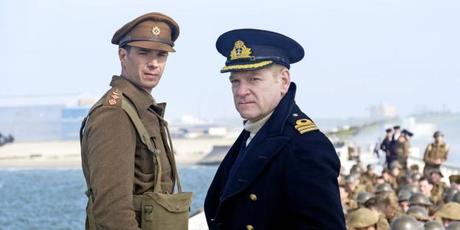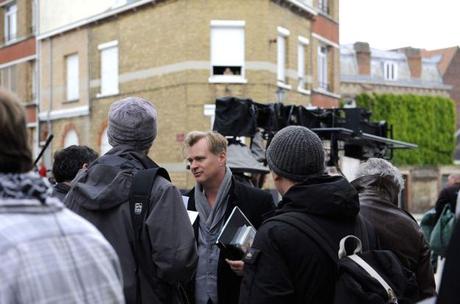I don't know how to write about Dunkirk.
I don't remember any of the characters' names, that is if I ever even caught their name to begin with. In fact, I actually struggled to tell some of them apart (so many pasty white British dudes, so little time). I was slow to catch on to the multiple perspective narrative structure which sees three different timelines co-existing for the entire length of the film before colliding in operatic fashion in the finale. And, frankly, I don't know enough about every little practical aspect of filmmaking to properly understand and/or articulate just how Christopher Nolan and his clearly talented crew pulled this off.
What I can tell you, though, is that the 106 minutes I spent watching Dunkirk this past weekend are among the most tense, yet ultimately rewarding minutes I've ever spent watching a single movie. It's not so much a movie as it is an experience, in the purest, least Hollywood bullshit advertising meaning of that word. After the experience of watching this movie I felt the need to hug those around me as if we were all soldiers who'd just survived a harrowing ordeal. Of course, I didn't do that because, ya know, that'd be weird, but the fact that I wanted to says a lot.
But why? Why is Dunkirk s o effective? Also, what is it about because you kind of haven't talked about that yet?
Mandatory Wikipedia-like history lesson part of the review: Dunkirk's a place. WWII soldiers were trapped there. They had to wait a long time to be evacuated. It was tough.
Huh. Feels like I'm leaving out some details there, but so does Dunkirk. In true Christopher Nolan fashion, Dunkirk expects its audience to be able to follow along and fill in gaps where necessary. There's an opening title card offering brief background, and a shot of propaganda leaflets being dropped on the British soldiers by the Germans with clear text reading "You are surrounded!" Beyond that, all you need to know is the odds are ever not in the Brits favor here, with 400,000 troops stranded on a French beach awaiting a rescue which the resource-strapped Allies can barely offer. They are sitting ducks for German fighter planes, and have literally nowhere to run and hide should the German Army advance on them. What makes it worse is, as the movie tells us on three different occasions, they can almost literally see Britain from the beach. The straits, they be dire.

Caption: If you get truly and deeply lost trying to suss out the details just remember to pay close attention whenever Kenneth Brannagh's character talks because he's to Dunkirk what Ellen Page is to Inception, i.e., Basil Exposition.
The more conventional approach would be to focus on the soldiers fighting on the front lines to hold off the Germans or perhaps on the British fighter planes providing aerial coverage for the 400,000 on the beach or perhaps just simply on a small subset of the soldiers on the beach, undoubtedly leaning into war movie cliches by making each soldier in this little unit less an actual person and more an archetype thus making it easier on us to tell just who's going to die and who's going to survive. Heck, there's another aspect to this story - the Allies had so few boats to spare that private British citizens sailed fishing boats, yachts and the like to Dunkirk to assist with the rescue effort - which could have been a whole movie to itself, maybe a Finest Hours situation just with Chris Pine saving a bunch of Brits instead of Casey Affleck and pals.
But this is Christopher Nolan. He doesn't do conventional. As has now become the primary sticking point for any of Dunkirk 's detractors, Nolan tells the story in three different timelines and locales, with one week transpiring on the beach (which is where Brannagh and his pasty white dude co-stars reside), one day passing on the sea (which is where Mark Rylance's noble adventure as a citizen sailor en route to Dunkirk happens) and one hour in the air (which is where Tom Hardy shoots Nazi planes while talking through a mask because Nolan loves to cover that man's preternaturally beautiful face and force him to simply act with his eyes).
There are brief title cards demarcating these sections once they start, but if you're not paying close enough attention you might think them to be chapter titles or pithy whatevers, leading you to joke to yourself, "What is this, Frasier?" It might not be until the times of day between the sections fail to match that you completely catch on that these events are not happening simultaneously.
Nolan explained his reasoning for this structure to Total Film, saying, "My attempt is to address various different essential experiences. So the experience of being on the beach, of being trapped there; the experience of coming to aid those people on one of the little ships; the experience of being in the air and fighting people in the air battle above them. Those seem to me to be three aspects you could grab hold of."

The criticism is this is just Nolan dipping into his old non-linear bag of tricks, and in this particular case it's an unnecessary affectation instead of a truly essential part of telling this story. Such a shame, then, that so much work on the part of his crew of talented technicians and engineers to produce as realistic a war film as possible has been undercut by his predilection for juggling perspectives and convention-flaunting.
However, I don't know that I agree because I don't know if Dunkirk would be as effective as a completely linear narrative. Much of the tension - aided so considerably by Hans Zimmer's ever-present, unrelenting, tick-tock score as well as the fact that we never actually see any of the enemies - comes from the way we drop in on one section of the story only to be pulled out and taken elsewhere once we've been pushed to the edge of our seat, leaving us constantly longing for a resolution we are repeatedly denied. Plus, the Rashomon-effect which comes into play later on in the film once the three timelines finally start to collide produces several rich moments which offer further definition to events we believed to mean one thing when in fact they meant something else.
If there's a truly false note in the film it actually stems from its most conventional sequence, a "here comes the cavalry" display of heroics from the citizen sailors which tries too hard to tell the audience how to feel, all the more notably so since it is the only portion of Zimmer's score which bows to war movie cliche. The entire film builds to this moment and is designed to finally offer the audience an emotional release, giving us the "you can finally unclench your buttcheeks" sense of tension relief. However, because it differs so considerably from what came before and, indeed, what comes after, it sticks out as feeling just a bit off.
But it's a minor fault, not a major one, especially considering how the actual ending does not succumb to similar theatrics and instead closes out on a note which just hangs there and leaves us to digest what to make of the way Churchill spun the Dunkirk "victory" (the victory was getting as many soldiers home as they did; they actually lost the battle and many, many soldiers were still taken prisoner).
THE BOTTOM LINEDunkirk truly is unlike anything I've ever seen before, and I'm someone who once took a college class where all we did was watch WWII movies. This...this is not a war movie. It's a survival movie which just happens to feature lots and lots of soldiers, most of whom do not succumb to war movie cliche and instead simply fight to survive. That Nolan chose to tell us this survival story in three parts laid on top of each other is likely vexing to his critics or just those who feel this story would have been better served with a more traditional linear approach. However, the catharsis which comes when the three timelines finally match up is as powerful a cinematic moment as I've experience with any film all year.
ROTTENTOMATOES CONSENSUS

